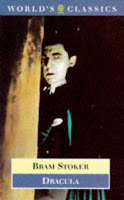Vampires seem to be quite prominent in popular culture these days, so for a while now I've been curious to read first major literary incarnation. My mild interest in Dracula was further increased by Alan Moore's take on the character of Mina Murray (Harker) in The League of Extraordinary Gentlemen. The book seems pretty different than what I think most modern readers would expect-- slower moving, and almost a matching of wits between some very clever antagonists. The rules about what vampires can and can't do seems a little different than any I've heard elsewhere, but it seems like every book and every movie has to change the rules or reinvent something about vampires, so I guess it's not that surprising. Thinking about vampires in this Victorian setting also made me wonder why we're so interested in them now, and what (or whether) people think about the spiritual aspects of the vampire, and the damnation of the souls who are turned. There also seems to be an interesting hierarchy of who feeds on whom, which seems like it must be based in Stoker's time-- Dracula feeds on young women, and the women prefer to feed on babies.
It was a pretty interesting book, and I was a little surprised at how engaged I was. The whole thing is narrated through the character's diary entries, letters, and newspaper clippings. Sometimes this is a lot less believable than others, as they are recounting entire conversations, and it's a little hard to imagine that in the middle of tracking down and fighting this monster they are taking time to sit and write (or, in one case, dictate to a phonograph). Mina does shorthand and is also a typist-- which turns out to be quite important, because it helps them get the details and put them in the proper order so they can figure out Dracula's plan. This also helps illustrate what an intelligent woman Mina is.
I imagine it's because I have Harry Potter on the brain, but there was an interesting parallel between Harry's connection with Voldemort and Mina's connection to Dracula. Dracula drinks some of Mina's blood and starts to turn her, but then he also forces her to drink some of his, which is meant to give him extra power over her. But this connects them, and as they chase Dracula from London back to his castle in Transylvania, each sunset and dawn Van Helsing is able to hypnotize Mina to find out where Dracula is, what he can here.
Van Helsing is an interesting character, too-- not the dashing young hero of a movie, but an older man, a scholar and a doctor. He is the first to figure out what is going on because he has a more open mind.
The edition I read includes an "Introduction," which I started out reading first-- until it started touching on more and more plot points! This frustrated me, so I skipped it at the time. I read it afterwards, and it was a fairly interesting discussion of all the many, varied interpretations of Dracula (and there are lots, more than even I would have expected). It's an interesting enough essay and overview of the craziness that is Dracula criticism, but I think it fails miserably as an introduction.
I picked this up because I wanted to have something to read while I was waiting for Harry Potter, and I figured I could finish it in a week.
| Title: | Dracula |
|---|---|
| Author: | Bram Stoker |
| Date published: | 1897 (original publication) |
| Genre: | Horror |
| Number of pages: | 409 |



0 comments:
Post a Comment